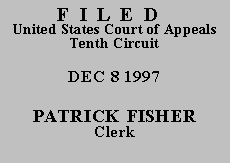 UNITED STATES COURT OF APPEALS
UNITED STATES COURT OF APPEALS
 UNITED STATES COURT OF APPEALS
UNITED STATES COURT OF APPEALS
Darren Eugene Perkins, a pro se state prisoner, brought these actions under 42 U.S.C. § 1983 asserting constitutional violations arising from his confinement in disciplinary segregation. In appeal 97-3175, Mr. Perkins asserts that his placement in a small cell without electrical outlets, table, chair, or shelving for over seven months for twenty-three hours a day violated the Kansas Advisory Jail Standards, as well as double jeopardy, equal protection, and the prohibition against cruel and unusual punishment. After obtaining a Martinez report, the district court ruled that Mr. Perkins had failed to demonstrate a violation of his constitutional rights and granted defendants' motion for summary judgment.
We have carefully reviewed the lower court's thorough and well-reasoned memorandum, and we AFFIRM substantially on the basis of the analysis and authorities set out therein.
In related appeal 97-3154, Mr. Perkins asserts that his constitutional right to privacy was violated when defendant Sherry Dettman-Roudybush revealed facts concerning his medical condition to two other prison officials. Mr. Perkins had written to the Secretary of Corrections and to the prison ombudsman to complain that his placement in the cell described above had aggravated his medical problems. He asserts that this letter was given to Ms. Dettman-Roudybush, a prison nurse who was the Medical Contract Management Consultant, and that she in turn discussed the letter with the prison warden and the prison Secretary of Programs and Staff Development.
The district court dismissed the action as frivolous, pointing out that under an applicable prison regulation, information contained in a prisoner's medical reports can be released to the warden and to the warden's designees without written authorization under the circumstances here. We have carefully reviewed the district court's ruling and we find no reversible error. Accordingly, the dismissal is AFFIRMED.
ENTERED FOR THE COURT
Stephanie K. Seymour
Chief Judge
*.This order and judgment is not binding precedent, except under the doctrines of law of the case, res judicata, or collateral estoppel. The court generally disfavors the citation of orders and judgments; nevertheless, an order and judgment may be cited under the terms and conditions of 10th Cir. R. 36.3.